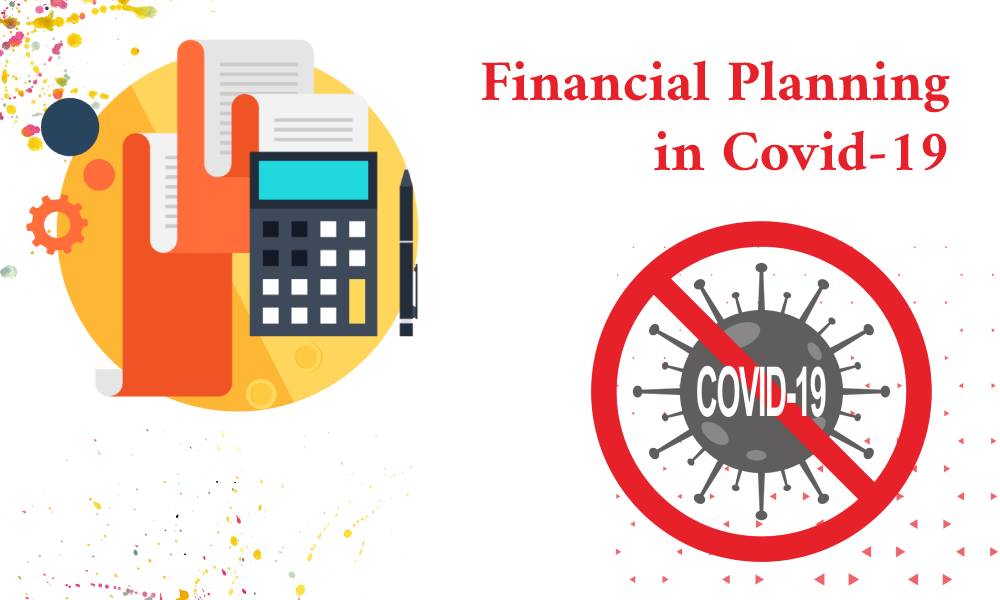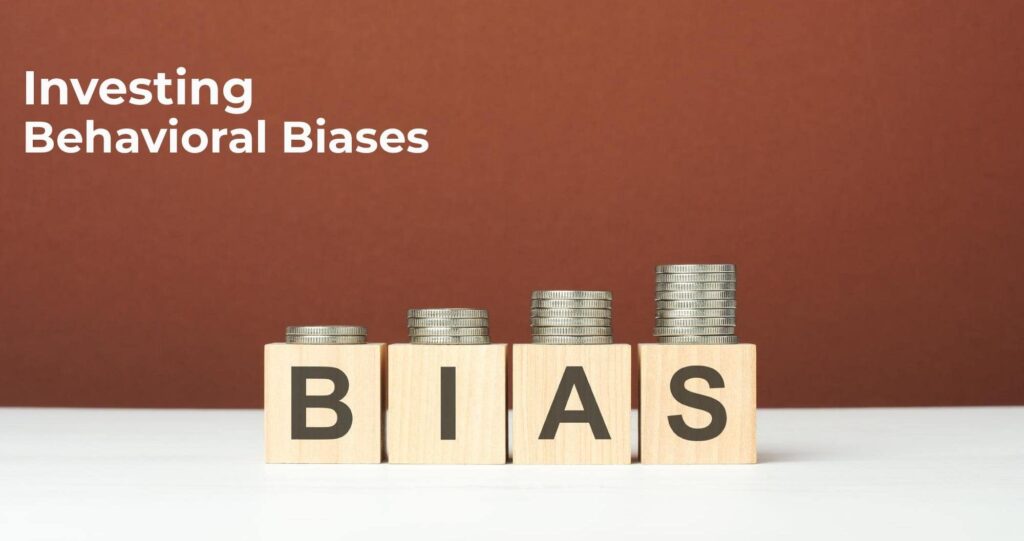In the past two years approximately, equity fund investors have experienced a roller coaster of emotions because the equity market moved from multi-year lows in March 2020, to all-time high within the half-moon of 2021 sailing the emotions from extreme fear to euphoria. Equity market and emotions go hand in hand. However, reacting to the market fluctuations can make it difficult for investors to think about their financial goals. Say, during the downturns it’ll be dreadful to work upon the price of the hard-earned money eroding. And, if one opts to redeem the investment will lead to transferring notional loss into actual loss.
One must do their own research before investing. Know what you own, and know why you own it. Make informed decisions. If one doesn’t feel confident about financial planning, it would be better to hunt for professional help. Many often tempt others to follow the investment form of a well-known investor who is tasting success. However, their investment strategy may not align with their risk profile or financial goals.
A common mistake that investors make is to treat equity mutual funds like stocks. Even though equity mutual funds are market-linked and returns are not guaranteed, it must not be a cause of worry if the investor has a long term investment horizon. The impact of volatility on the mutual fund returns negates over a period of time and one gets the opportunity to earn handsome returns in the long run. Therefore, one must avoid investing in equity mutual funds for an investment horizon of less than 3 years.
Investing in mutual funds via SIP makes timing the market irrelevant, as one buys less units via SIP when the market is on an upward trend and buys more units when there is a market downturn which averages out the cost of investment. A well-diversified portfolio of mutual funds helps to lower the risk and ensures peace of mind. By diversifying investments or allocating assets across categories will save from the hassle of constantly churning the portfolio in line with the dynamic market conditions.
Equity mutual fund investments are susceptible to the market. Rebalancing asset allocation will assure whether the portfolio is on the right track to achieve set goals. It will also help to find out if there is a need to make changes in the portfolio like replacing consistently underperformed funds. Reacting to market behavior can lead to unnecessary stress and cause you to deviate from your goals. Instead one must focus on building a strong portfolio on both up and downside conditions.
One should opt for the Core & Satellite approach to investing, that will help ensure balancing risks and returns at the same time. The ‘Core’ holding should comprise around 65-70% of the equity mutual fund portfolio and consist of a Large-cap Fund, Flexi-cap Fund, and Value Fund/Contra Fund. The ‘Satellite’ holdings of the portfolio can be around 30-35% comprising a Mid-Cap Fund and an Aggressive Hybrid Fund.







tadalafil 40mg drug order cialis 40mg without prescription ed pills comparison
Bravo is hands down the best poker app for anyone who wants to monitor the cash game scene in their area. Bravo Poker has made me thousands of dollars. Just the other day I caught wind of a game I may not have if I had to call in and ask what was running. I scooped in and printed. Whenever I am somewhere next to a casino, I am constantly monitoring games, and with a few clicks I can see all the action (including waiting lists) for every game type. Major casinos like Aria, Bellagio, Commerce and Wynn all update their game boards in real time through Bravo. You can also favorite your local casinos for easy viewings. Why miss another game? To the best of my knowledge, there are currently two major sites offering this option, namely PokerStars and 888poker, both of which are on Casino.org’s list of recommended online poker sites.
https://worldlotteryplayers.com/community/profile/hudsonleddy961/
CASINOCASINO HIGHLIGHTS There’s no CasinoCasino mobile app to download from Google Play or an apk file to install manually. The venue’s mobile casino is available for instant play only and offers a rather good mobile gaming experience. Games load fast, crashes rarely happen and more importantly, game diversity is excellent. Moreover, all of this is available even for older mobile devices running Android 5.0 or later. No, you haven’t misread its name nor you see things double, it is CasinoCasino. The simple yet effective name followed by the motto “Double the fun!” suggest loads of entertainment once you join the gaming establishment founded by L&L Europe. The Malta-based company is well-known for providing a state-of-the-art environment with games supplied by the biggest names in the industry on offer and the gaming venue in question is no exception. Featuring two smiling oranges as its logo, CasinoCasino offers a plethora of virtual and live casino games available on desktop and mobile devices.
DIRECCIÓN DE CASINOS Y JUEGOS DE AZAR Nuestra política de cancelación no contempla la devolución del dinero en caso de no poder asistir a un evento. Operated by TSG Interactive Gaming Europe Limited, a company registered in Malta under No. C54266, with registered office at Spinola Park, Level 2, Triq Mikiel Ang Borg, St Julians SPK 1000, Malta. License No. MGA B2C 213 2011, awarded on August 1, 2018. Maltese VAT-ID MT24413927. Online gambling is regulated in Malta by the Malta Gaming Authority. Indicaciones para disfrutar de un juego responsable ¡Lo bueno está a punto de convertirse en lo MEJOR! Disfruta de nuestros torneos de póker semanales (todos los martes, miércoles, jueves y viernes) Siete casillas, siete jugadores y una única decisión: Ir o no ir.
https://www.random-bookmarks.win/ruleta-ingles
Latest Version: Sí. Estas frente a un casino en línea que cuenta con licencia de la Autoridad del Juego de Malta y aprobación de eCOGRA, un organismo regulador independiente. Pero eso no es todo, porque también empleamos tecnología de encriptado digital SSL de 128 bits para garantizar tu seguridad. Y recuerda, en COPE encontrarás el mejor análisis sobre la actualidad, las claves de nuestros comunicadores para entender todo lo que te rodea, las mejores historias, el entretenimiento y, sobre todo, aquellos sonidos que no puedes encontrar en ningún otro lado. ¿Necesitas más razones para jugar? Vamos, descarga la aplicación y recolecta tus ganancias con esta tragamonedas granjera. 4. Descargar y instalar La Granja – Máquina Tragaperras Bar Gratis Online
Super Bowl LVII will be Iowa’s fourth with legal online sports betting, and Hawkeye State bettors suffer no lack of options. All the nation’s most prominent betting sites, and more than a few lesser-known brands, will be taking wagers on the Big Game and offering Super Bowl betting promotions between now and kickoff. “The Game Day” is an online entertainment network that focuses on sports betting. It’s looking for someone to watch the game and detail everything that takes place, from the game itself, to the halftime show, to the commercials. Gambling should be entertaining. Remember that you always risk losing the money you bet, so do not spend more than you can afford to lose. If you think you may have a problem, click here.
https://www.bookmarkmaster.win/best-welcome-bonus-bookmakers
Betting favourites on the moneyline means risking whatever the line says to win $100. Thus, a moneyline bet on the Maple Leafs requires a $300 stake to win $100. That translates to $150 risk for $50 in profit, or $30 for every $10. This hugely-important game matches the No. 6 scoring offense in the Bengals against the No. 2 scoring defense. It pits the Bills’ No. 4 scoring offense against the Bengals’ No. 9 scoring defense. Forget the numbers. This game puts Joe Burrow, Ja’Marr Chase, Josh Allen, and Stefon Diggs on the same field together for the first time. Opening Lines in college football are typically set on Sunday afternoons in the current week and you usually see immediate action cause line movement. The Spread is based on a rough projection of a score for every matchup, although oddsmakers have a good idea of what side the betting public will want to bet and usually saddles that team with an additional point or three. The same goes for the Total, which projects the combined number of points expected in a contest.
altace 5mg canada buy arcoxia 60mg without prescription etoricoxib online order
Die Lottovariante 6 aus 45 stammt aus Österreich und zählt dort, ähnlich wie in Deutschland das Spiel 6 aus 49, mit zu den Klassikern. Nachzuvollziehen ist das Spiel recht einfach. Mit geringen Einsätzen kann jeder, der das nötige Glück besitzt, zum Lottogewinner werden. Neben der klassischen Spielvariante lässt sich 6 aus 45 ganz einfach online spielen. Welche seriösen Anbieter es für das Onlineverfahren gibt, hat Betrugstest aufgedeckt. Im Test hat Lottoland eine besondere hohe Seriosität bewiesen. Gewinnerin meldet sich erst verzögert Dass sich die frisch gebackene Multimillionen-Gewinnerin aus Kärnten erst nach ein paar Tagen meldete, ist dabei nicht ungewohnt bei Großgewinnen. Neben dem Schreck gilt es auch ein paar Formalitäten zu erbringen. So muss die Quittung natürlich als Nachweis der ordnungsgemäßen Spielteilnahme vorgelegt werden. Von der Lottogesellschaft bekommt der Gewinner dann fachkundige Unterstützung durch einen Großgewinn Betreuer. Diese unterstützen die unverhofften Lottogewinne in der Herausforderung, mit dem Gewinn bestmöglich umzugehen.
https://smart-wiki.win/index.php?title=Merkur_online_casino_mit_echtgeld
Casino-Apps mit Echtgeld – gibt es das? Gibt es überhaupt Gründe, sich nicht für ein Casino mit PayPal Zahlung zu entscheiden? Gibt es auch Schwachstellen, die man beachten sollte, um in Casinos mit PayPal Einzahlung zu zocken? Können Sie auf der Casino Homepage keinen Hinweis auf eine gültige Casino Lizenz finden, sollten Sie sich um einen anderen Anbieter umsehen. Es gibt so viele seriöse Online Casinos in Deutschland, dass die Auswahl eines Online Casinos wirklich nicht zum Glücksspiel werden muss. Die Marke PayPal genießt bei vielen Spielern einen hervorragenden Ruf. Auf der anderen Seite muss man auch zweimal hinschauen. Denn PayPal hat leider in jüngster Zeit für schlechte Schlagzeilen gesorgt. Darüber hinaus finden wir es unfair, dass Spielerkonten ohne Ankündigung bei PayPal geschlossen werden können. Außerdem stellt PayPal Transfergebühren in Rechnung. Zu guter Letzt zog sich PayPal Ende 2019 komplett aus dem Online-Glücksspiel-Segment zurück. D.h. ein seriöses Online Casino mit PayPal gibt es nicht mehr. Wettanbieter PayPal schon!
Super Nudes Eye Liner Duo: This black-brown and nude eyeliner duo allows you to PLAY WITH LIGHT and DARK, brightness and shade, to create a more FELINE, MESMERIC EYE that’s perfect with a natural nude makeup look! Welcome back to Maybelline Express RELATED LINKS: We may earn commission from links on this page, but we only recommend products we back. Why Trust Us? While the bold looks with a red lip or smokey eyes remain classic, women all over the world are slowly becoming obsessed with the nude makeup look. It is simple, looks classy, requires minimum products and goes with every outfit. This makes it the go-to makeup look to wear everyday as well as on occasions for most women. Celebrities are equally obsessed with this makeup trend, so much so that some of them even preferred to wear it on their wedding day! Since it is the trendiest and most sought-after makeup look right now, it is imperative you learn how to create the perfect nude makeup look for yourself in a few easy steps.
http://vcntec.com/bbs/board.php?bo_table=free&wr_id=62688
Sadly this product is not 100% fungal acne safe. It contains sweet almond and hemp seed oil which are F.A triggers. All rights reserved. } The color and texture of Matcha Hemp Hydrating Cleanser may naturally vary slightly from batch to batch. No worries! This is a normal occurrence when using naturally-derived ingredients and it does not impact the efficacy of the formula. All rights reserved. I love this cleanser! No fuss, doesn’t dry out my skin but it feels clean. Reminds me of the Dr. Loretta gentle hydrating cleanser. Wish they made it in a travel size!!!!! You know that tight feeling your skin has after using other cleansers? That is an indication that the pH is too high and your skin is being dehydrated and stripped of the oils and lipids it needs to function and maintain its health. This cleanser’s pH ranges from 5.0 – 6.0. This is very important. Your cleanser should always be acidic on the pH scale. Your skin is already naturally acidic. Using alkaline (pH of 8 or higher) products disrupts the barrier’s function.
order asacol 800mg online buy astelin 10 ml generic irbesartan 300mg price
temovate order online order clobetasol online cheap cordarone 200mg for sale
order diamox sale imdur 20mg without prescription imuran drug
buy lanoxin 250 mg without prescription order molnupiravir 200mg pill molnupiravir 200 mg without prescription
naprosyn 250mg cheap lansoprazole 15mg pills order lansoprazole online cheap
buy proventil without a prescription purchase pyridium generic purchase phenazopyridine
buy montelukast 10mg online brand singulair 10mg how to buy dapsone
dapoxetine 90mg over the counter oral cytotec 200mcg brand orlistat 60mg
diltiazem sale acyclovir 800mg generic order allopurinol generic
order rosuvastatin 10mg without prescription rosuvastatin order cost motilium
order tetracycline generic ozobax usa baclofen price
buy toradol 10mg for sale ketorolac usa how to get inderal without a prescription
buy clopidogrel 75mg generic methotrexate 10mg cheap warfarin 5mg without prescription
purchase budesonide online cheap buy careprost sale buy generic careprost online
metoclopramide 20mg pills esomeprazole 20mg pills buy esomeprazole for sale